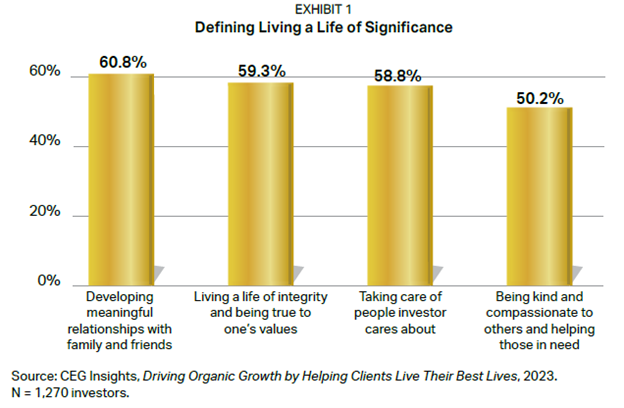Don’t Have a Vision for Retirement? It’s Time To Fix That!

There’s a lot to plan for when it comes to retirement. Most often, it seems, we focus on the financial side of those impending golden years—and with good reason: Without a big enough nest egg from working, saving and investing, retirement stands to be challenging and uncomfortable—maybe even downright bleak.
But we believe an equally important issue—one that’s too often not addressed, even as the office retirement party looms—is just what you plan to do with all that newfound free time.
In our experience, many people don’t have a clear vision of what they want their golden years to look like. Indeed, plenty of people don’t even really grasp what’s possible for them in retirement.
This is often true of the stereotypical hard-charging “type A” folks who seemingly devote their entire working years to accomplishing more and more. They may have maxed out their Roth IRAs and 401(k)s, but they didn’t consider what fulfilling goals they might accomplish—or even what they might do with themselves day to day—once their working life is over.
As a result, people without a healthy retirement life plan can find themselves rudderless and bored. A listless lack of structure to their days and weeks, in the absence of goals and direction, may cause depression or even contribute to dementia or other forms of cognitive decline.
Don’t let that happen to you. Instead, aim to create a strong, clear and compelling vision of what you want your retirement to be—ideally, well before you stop working. That vision may very well help you continue to lead a fulfilling life of significance and deep meaning, on your terms, for decades.
What’s blocking your vision?
There may be numerous reasons why people often don’t give much deep thought to the idea of what a meaningful and significant life during retirement looks like. For example:
Retirement seems too far off
If you have decades until you plan to retire, it may be truly challenging to envision what you want those later years to look like. You might be right in the middle of figuring out your wants, needs and preferences in your daily life today, and the idea of painting a clear picture of your distant future might seem wholly unrealistic.
You’re extremely busy in the here and now
As noted, you might be spending the bulk of your time working to build more wealth and get ahead in your profession. If you’re an entrepreneur, each day could feel like a nonstop roller coaster ride. Or you may be raising a family and tackling a seemingly endless list of responsibilities. The upshot: Your life vision might not extend beyond the end of the current fiscal year—or further than tomorrow!
You struggle to think big
It can be tough for people to imagine really bold, fulfilling futures full of possibilities. Thinking creatively and “dreaming big” to come up with a vision of an amazing life of significance don’t come easily to many of us—especially if we’re being pulled in many directions in the moment.
Indeed, research into cognition reveals that the human brain can easily experience what’s called status quo bias—which describes a preference for the current state of affairs, resulting in resistance to change. We tend to accept situations in life as fixed, so we default to operating within their existing framework. As a result, we fail to question why things are the way they are—and how things might be improved upon.
Having an understanding of why you may be struggling to create a solid vision of your retirement years can potentially help you take steps to overcome those hurdles.
Action steps to help create a vision
The good news is that there are steps you can take to develop and refine a clear vision of retirement—or at least, a clearer vision than you have at the moment. Here are some ideas to consider.
Step #1: Keep a running list of ideas as they occur to you.
Don’t let the belief that retirement is too far in the future to think about in any detail stop you from generating ideas. As you live your life, look around for ideas of what your distant future could possibly look like—and make an ongoing list. Your ideas will evolve over time, of course, with some possibilities rising up the ranks and others falling off the list entirely. The point is to essentially scan the world around you for possibilities and options that resonate. Starting that process as early as you can may enable you to generate bigger, bolder ideas over the years as you essentially train your brain to be on the lookout for meaningful life moments.
Step #2: Carve out formal “vision time.”
Busy people are often great at scheduling time for meetings, business strategy sessions, conferences, webinars and the like. But they seem to be far poorer at creating formal, structured time and space for themselves. If that sounds familiar, you have ve got a tough but doable job: Carve out time each week to think about big-picture issues such as your vision for your life and the things that bring you great joy and a sense of deeper purpose. Book that time on your calendar, and consider it just as important as any other scheduled event that you wouldn’t dream of canceling. Try to set aside the same block of time on the same day each week for this purpose to help ensure you consistently stay on track. During that time, lock up your phone and get away from your computer or other distractions so you can focus on the most important person at that moment: you. If you’re tempted to skip this “focused time,” remember the words of Warren Buffett: “I insist on a lot of time being spent, almost every day, to just sit and think.”
Step #3: Boost your creative thinking abilities
If you just can’t see what a life of significance in retirement would look like for you, enlist the help of a pro such as a reputable life coach who specializes in vision planning. These coaches often have defined processes they use to help people identify their passions and think bigger than they’re used to doing. Another possible outlet for new ideas: retirees who once worked in similar positions as you in your company or the broader industry, with whom you may share similar life experiences.
Also, we find that some affluent families hold facilitated family meetings every year or so at which they discuss issues such as family legacy and purpose. These meetings, which may be arranged and organized by a financial advisor, can potentially help you gather ideas from (and brainstorm with) some of the people to whom you’re closest in life.
Of course, there are plenty of ways to boost your own creative juices. A few examples:
- Spending time outdoors, in nature, has been shown to enhance activity in the areas of the brain responsible for creative thinking.
- Exercise also triggers creativity.
- Having a diverse group of friends or acquaintances—ones who don’t all look, act and think as you do—may help you develop “more complex forms of thought, including the ability to think critically,” according to Johns Hopkins research.
What does a life of significance look like?
Hopefully, your efforts help bring both a sense of what’s possible in retirement and a level of clarity about which options are most appealing. You might find that you wish to be a “collector of experiences” by engaging in lots of travel and new-to-you activities. Or you might recognize that your “retirement” would be best spent in a workplace environment, mentoring young entrepreneurs or up-and-coming leaders to pursue the type of success you enjoyed. The “right” answer will be different for each person.
That said, it may be helpful to go into the thinking process with some overarching guidelines of what your peers see as living a great life. CEG Insights research found that most investors define “living a life of significance” as developing meaningful relationships with family and friends, followed by living a life of integrity and being true to their values, and helping others around them (see Exhibit 1). The specifics of your own vision for retirement could be organized around these or similar categories.

You’re working hard to set yourself up financially for a comfortable retirement. But don’t overlook getting a good handle on what you want those years to look like. Doing some deep, careful thinking upfront may be just what’s needed to get you on a retirement path filled with purpose, meaning and fun.
ACKNOWLEDGMENT: This article was published by the VFO Inner Circle, a global financial concierge group working with affluent individuals and families and is distributed with its permission.
VFO Inner Circle Special Report
By John J. Bowen Jr.
© Copyright 2025 by AES Nation, LLC. All rights reserved.
No part of this publication may be reproduced or retransmitted in any form or by any means, including but not limited to electronic, mechanical, photocopying, recording or any information storage retrieval system, without the prior written permission of the publisher. Unauthorized copying may subject violators to criminal penalties as well as liabilities for substantial monetary damages up to $100,000 per infringement, costs and attorneys’ fees.
This publication should not be utilized as a substitute for professional advice in specific situations. If legal, medical, accounting, financial, consulting, coaching or other professional advice is required, the services of the appropriate professional should be sought. Neither the author nor the publisher may be held liable in any way for any interpretation or use of the information in this publication.
The author will make recommendations for solutions for you to explore that are not his own. Any recommendation is always based on the author’s research and experience.
The information contained herein is accurate to the best of the publisher’s and author’s knowledge; however, the publisher and author can accept no responsibility for the accuracy or completeness of such information or for loss or damage caused by any use thereof.
This report is intended to be used for educational purposes only and does not constitute a solicitation to purchase any security or advisory services. Past performance is no guarantee of future results. An investment in any security involves significant risks and any investment may lose value. Refer to all risk disclosures related to each security product carefully before investing. Securities offered through CMH Wealth Management. Craig Hausz is a registered representative of CMH Wealth Management. Craig Hausz and CMH Wealth Management are not affiliated with AES Nation, LLC.


